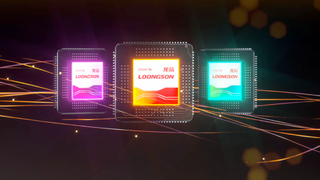China-Made Loongson CPUs Bound for Russia After Export Ban Lifted
CPUs from blacklisted Loongson are coming to Russia.

In late 2022, the Chinese government banned exports of Loongson's latest LS5000-series CPUs to Russia, citing national security concerns. But in March 2023, the U.S. blacklisted Loongson and limited its access to American technologies, which is perhaps why the Chinese government decided to lift the ban on exports of these CPUs. As a result, at least two Russian companies are planning to produce Loongson-based systems, reports Kommersant.
Norsi-Trans and Promobit are leading the initiative, aiming to produce servers, storage systems, and computers powered by Loongson's 5000-series processors using the LoongArch architecture. So far, Norsi-Trans has purchased around 100 Loongson processors for the initial production phase. They have also received the green light for incorporation into the official registry of Russian electronics.
These Russian tech companies eye the Loongson processors as viable alternatives to their American counterparts from AMD and Intel. However, there is a slight catch: software support. Norsi-Trans will collaborate with Basalt SPO, an Alt operating system developer, to adapt the OS to work seamlessly with the Loongson processors. Meanwhile, it is unclear when Basalt SPO will tailor its OS for Loongson's CPUs.
The decisions by the Russian companies to opt for Loongson processors were made with strategic considerations. The Chinese government previously restricted these processors from export due to their critical technological significance, including applications in China's military-industrial complex. The loosening of these restrictions and the resurgence of Loongson processors in international collaborations coincide with rising geopolitical tensions. Essentially, Norsi-Trans and Prombit want to build a more self-sufficient tech ecosystem, less vulnerable to foreign sanctions and supply chain disruptions.
"Because the X86 and Arm architectures are controlled by the American and British governments, there is always a threat of disconnection or incorrect processor operation," said Grigory Sizonenk, chief executive of IVK, in a conversation with Kommersant. "Therefore, Loongson chips look more attractive.
However, despite these collaborative advancements, industry experts express caution. While mitigating reliance on American technologies, the move might introduce a new dependency on Chinese tech. Voices within the industry, such as the president of Russoft, Valentin Makarov, underscore the importance of negotiating mutual market and technology access with Chinese partners, ensuring a balanced technological exchange and collaboration.
"We will just replace dependence on American processors with the same dependence on Chinese ones," Makarov said. "Therefore, it is necessary to negotiate with Chinese partners for mirror access of Russian IT products to the Chinese market or access to Chinese technologies."
Stay On the Cutting Edge: Get the Tom's Hardware Newsletter
Get Tom's Hardware's best news and in-depth reviews, straight to your inbox.

Anton Shilov is a Freelance News Writer at Tom’s Hardware US. Over the past couple of decades, he has covered everything from CPUs and GPUs to supercomputers and from modern process technologies and latest fab tools to high-tech industry trends.
-
bit_user Current title misspelled Loongson.Reply
"We will just replace dependence on American processors with the same dependence on Chinese ones," Makarov said. "Therefore, it is necessary to negotiate with Chinese partners for mirror access of Russian IT products to the Chinese market or access to Chinese technologies."
I agree with the stated risk, but not the solution. The latter sounds like just angling for access to the Chinese market for short/medium-term economic reasons. If they truly wanted to limit their exposure to Chinese IP, then they should prefer a neutral ISA, like RISC-V. That will make it easier for them to switch providers, if/when the Chinese relationship becomes problematic. -
ivan_vy as expected if we follow the newsReply
https://www.tomshardware.com/news/russia-aims-to-mass-produce-28nm-chips-by-2027-14nm-by-2030Russia is still years behind in chip production, meanwhile has to rely on China, changing a master for another but in this case China is more aligned with Russia's interest than USA. -
zsydeepsky Replybit_user said:Current title misspelled Loongson.
I agree with the stated risk, but not the solution. The latter sounds like just angling for access to the Chinese market for short/medium-term economic reasons. If they truly wanted to limit their exposure to Chinese IP, then they should prefer a neutral ISA, like RISC-V. That will make it easier for them to switch providers, if/when the Chinese relationship becomes problematic.
no RISC-V chips on the shelf could provide the performance & broad Linux support like Loongson,, I would say for now Russians don't have other alternatives.
but I also agree that in the long run, RISC-V would be a much better choice. -
bit_user Reply
I guess not, but I was thinking longer-term. It does feel like we're probably just a couple years away from a viable RISC-V option.zsydeepsky said:no RISC-V chips on the shelf could provide the performance & broad Linux support like Loongson,, I would say for now Russians don't have other alternatives.
Most Popular


